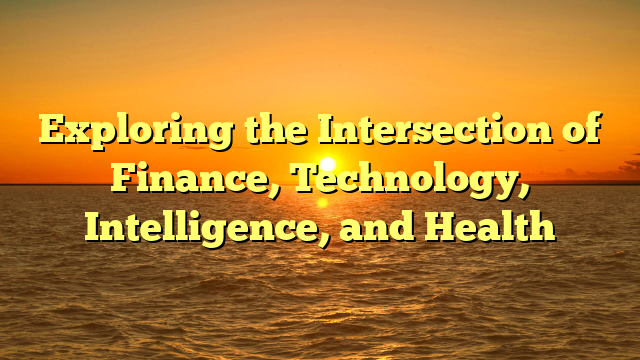In the modern era, the convergence of finance, technology, intelligence, and health is driving profound changes across the globe. Each sector influences the others, fostering innovation and providing solutions to pressing global challenges. This article delves into how these fields are interconnected and how they will evolve in the coming years.
1. The Impact of Finance on Global Development
Finance is the lifeblood of economic growth and stability. It encompasses everything from personal banking and investments to corporate financing and government spending. Over the years, the financial industry has undergone tremendous changes, driven by technological advancements and changing consumer behavior. panen66 login of digital payments, cryptocurrencies, and mobile banking is revolutionizing how we handle money. Furthermore, the global financial system is more interconnected than ever, with investments flowing across borders and impacting economies worldwide.
The future of finance is deeply intertwined with technology, especially in areas like artificial intelligence and machine learning. As we move toward a more digital-first financial world, institutions must remain vigilant to emerging risks, such as cyberattacks and fraud. Additionally, economic inequality remains a persistent issue, and the role of finance in addressing this gap will be crucial in ensuring a more equitable global society.
2. The Role of Technology in Shaping Our Future
Technology is at the forefront of every major advancement today. From automation and artificial intelligence to the Internet of Things (IoT) and biotechnology, technological innovations are revolutionizing every aspect of our lives. One of the most significant impacts of technology is on the workforce. Automation, for example, is transforming industries by increasing efficiency while reducing human labor costs. However, this also raises questions about job displacement and the need for reskilling workers to adapt to new technological environments.
The intersection of technology and healthcare is creating groundbreaking changes in the way we monitor and manage our health. Innovations like telemedicine, AI-powered diagnostics, and personalized medicine are transforming healthcare delivery. With the advent of AI and big data, health professionals can offer more precise treatments, leading to better outcomes for patients worldwide.
3. The Rise of Artificial Intelligence and Intelligence Systems
Artificial intelligence is becoming an essential tool in numerous industries, offering solutions to complex problems and enhancing productivity. In healthcare, AI is used to predict patient outcomes, identify new drug therapies, and automate administrative tasks. In finance, AI is transforming how investment decisions are made, helping analysts predict trends and optimize portfolios. As AI continues to evolve, its applications will expand further, potentially reshaping the job market, economy, and society as a whole.
The development of AI presents not only opportunities but also significant ethical challenges. There is growing concern about AI’s potential to exacerbate inequality, invade privacy, and perpetuate biases in decision-making. Addressing these issues through ethical guidelines, regulatory frameworks, and transparency in AI development is essential to ensuring that AI benefits all sectors of society, while minimizing its risks.
4. Health and Well-being in the Digital Age
Technology is transforming healthcare, making it more personalized and accessible. The use of wearable devices, such as fitness trackers and smartwatches, helps individuals monitor their physical activity and health metrics in real time. Additionally, digital health platforms allow users to engage with healthcare professionals and receive guidance remotely. As technology advances, these innovations will likely play an even larger role in preventive care, improving overall health outcomes.
Moreover, the digital health revolution is enabling greater access to healthcare in underserved areas. With telemedicine platforms, patients in remote regions can consult with doctors, reducing the need for long-distance travel and improving overall access to care. This has the potential to address health disparities and provide better healthcare outcomes for populations that were previously underserved.
Conclusion
Finance, technology, intelligence, and health are powerful forces driving global progress. While they offer significant potential for improving our lives, they also present challenges that require careful management. By embracing these innovations and addressing the associated risks, we can pave the way for a brighter, more inclusive future for everyone.
Exploring the Intersection of Finance, Technology, Intelligence, and Health


